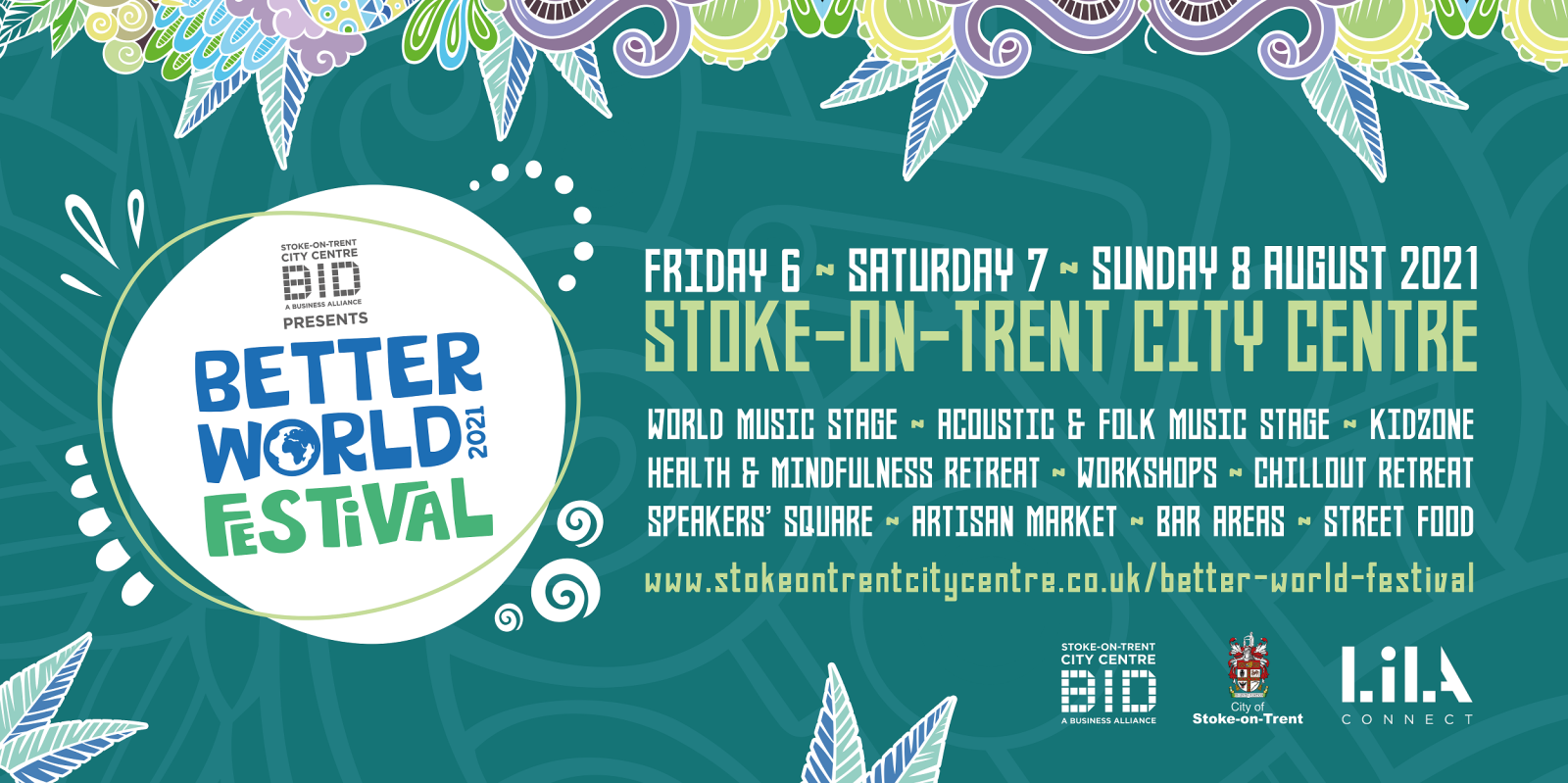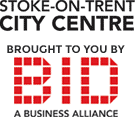By Jenny Amphlett for Stoke-on-Trent City Centre BID
Stoke-on-Trent City Centre is hosting an innovative three-day festival to highlight environmental issues and showcase the city centre BID’s ongoing commitment to green issues.

For three days in August Stoke-on-Trent City Centre will be taken over by a new environmental event, Better World Festival. But those three days are just the tip of the iceberg when it comes to Stoke-on-Trent City Centre BID’s aims for the environment.
From joint cardboard collections to a zero-waste shop and from encouraging people to cycle into the city centre to planting wildflowers, the BID’s plans are wide-ranging but realistic.
The Better World Festival, which will run from August 6 to 8, is the brainchild of BID Manager Richard Buxton who believes it to be the first event of its kind nationally.
Initial plans had to be put on hold due to the pandemic, but now it will be the first major event to welcome people back into the city centre in significant numbers.
“We think we’re unique in this,” he said. “We’re one of the first cities to put a whole event to this right in the public realm space. We’re not in a field or a close-by park or a green space, we’re in the city centre and we’re going to present everything we’ve got across that weekend in the city centre.”
There will be a world music stage, health and wellbeing sessions, an artisan market, children’s zone, speakers’ stage and presence from national organisations such as Greenpeace and Friends of the Earth - with everything linking back to the environment.
“The heart of the event is the Speakers’ Square stage,” said Richard. “This is where we’ve got local, national and some international groups who are coming to talk about the environment and how it affects us as individuals and communities.
“We thought we’d see if we could get some people in the environmental world who’ve really got something important to say on an international scale, never mind nationally. The first people that signed up to the event were Greenpeace. They’re giving talks and bringing a festival dome.
“Just as important are the local issues so we’ve got Staffordshire Wildlife Trust, B Arts, both universities and the Portland Inn Project who are all doing amazing work.”
For Richard, Better World offers an opportunity to tempt people back into the city centre while also tackling a hugely important issue.
“There are just as many people in Stoke-on-Trent who care about the environment and care about where they live and their own city centre as any other people of the country,” he said.
“The environment is not just about climate change and things like that, it’s the environment that we all live in.
“People in our city are engaged. What we’re trying to do with this is show ourselves as much as the outside world that we as a city in Stoke-on-Trent care about what happens.
“We also hope to inspire people to really think about what they do in their own homes, because we all forget sometimes. If we can inspire people to do their bit with things like recycling and respecting their city, then we’re heading in the right direction.
“We’ve got some incredible green spaces close to the city centre and we’ll be talking about how we can respect and enjoy them too.”
BID Board Director Paul Williams is clear that Better World isn’t solely a platform to raise environmental issues, it meets many of the BID’s other key priorities too.
“The BID is also looking to encourage more young people, the next generation of consumers, to visit the city centre. Research shows that young people, and teenagers in particular, are more ethically-conscious and environmentally-aware,” he said.
“Many aspects of the Better World Festival programme will appeal to this age group and hopefully mean they will view the city centre through a different lens, change their perceptions of what’s on offer and entice them to spend more time in our businesses and venues.
“The BID sees the Better World Festival as a platform or launch pad for communicating a number of environmental and ethical issues and the importance of the sustainable development goals to a wider audience in order to stir imaginations, create different narratives and win hearts and minds to help bring about the big lifestyle changes required to transition to a net zero economy.
“In this regard we see action on the environment, economic growth and social prosperity as complementary.”
As with so many BID initiatives, this isn’t something that it can do alone. It’s working in partnership with key stakeholders and needs buy-in from city centre businesses and members of the public too.
Paul said: “It’s important for the BID to work closely with our levy payers and other partners across the city to make the business case for sustainability and the environment by showing how the steps we all take can attract new customers, enhance brand value and reputation, reduce waste and lead to improvements in processes and efficiency which are convenient, accessible and affordable.
“The enormity of the environmental challenge means that the BID cannot empower citizens to create an environment-resilient city and a greener city centre without the support of partners including the city council, our universities, businesses and residents.”
He added: “The environment and sustainability is the challenge of our age. Better World Festival provides the perfect stage to build momentum, significantly shift attitudes and bring about lifestyle and behaviour changes to reduce our collective carbon footprint in a reimagined, repurposed city centre destination for all.”
Dr Elle Atkins, an ecology lecturer at Staffordshire University, is bringing a group of her students along to be part of the festival. They’ll run an interactive stand and talk to members of the public about how they can make the most of green spaces in the city. Elle will also give a talk on the speakers’ stage and hopes to share some of Staffordshire University’s own wide-ranging environmental projects.
“We want to be able to share what we’re doing with local people and share why it’s important to look after green sites in the city centre,” she said.
“We want to talk to people about where the green spaces are, how they can access them and what they might see. Those green spaces are so important for people’s mental health and wellbeing.”
Elle and her students will be trying to engage with people of all ages by encouraging them to try activities such as making seed bombs or planting wildflowers to take away with them.
“What we’re really excited about is being able to reach the people that live in this area, showing them the wild resources that are available to them and how they can benefit from using them,” she added.
“We’ll also be passing on the message about how we’re rewilding the whole of the Staffordshire University campus and that the campus and its nature reserve are open for anyone to enjoy.”
Rebecca Lancett, the Keele Hub Manager for Higher Horizons+ Uni Connect, is also hoping to engage hearts and minds at the festival.
Her remit is to encourage young people and adult learners who may not have considered higher education to think about taking the leap - and Better World will be her team’s first public event post-lockdown.
“We’re all really excited to be involved and to get out and have the chance to talk to people,” she said. “We really enjoy supporting local community events as it gives us the opportunity to speak to the public and offer advice and guidance.”
Another festival participant, B Arts, wants to engage with 11- to 25-year-olds who have something to say about climate justice and biodiversity through a poetry and spoken word competition on the speakers’ stage.
The B Arts project Speak Your Truth: Climate Slam has been made possible by an anonymous donation from a climate activist and will include workshops and performances.
The Better World Festival has the backing of Emma Bridgewater who, as the national president of the Campaign to Protect Rural England, is vocal about the importance of urban green spaces.
She said: “I love to walk along the canal in Stoke-on-Trent. The scenery is wild and wonderful through industrial wasteland and ghostly remains of old factories, with the occasional kingfisher and fishermen sighting.
“Now, more than ever, we need more quality green spaces available to everyone and to make sure young people form lifelong connections with nature that can help us bounce back from the pandemic and build resilience in the longer term.”
Related
Comments
Comments are disabled for this post.



 to add an item to your Itinerary basket.
to add an item to your Itinerary basket.



